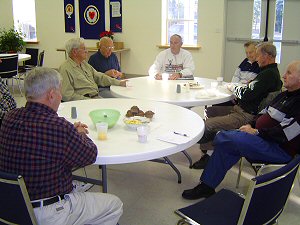Flexibility and Mobility Are Quality of Life
Issues

"I can help you do what you want to do. But you need to do two things.
One, you need to show up! Two, you need to do some things outside our
gym as well." Bryant Boykin, General Manager with Jason's Health and
Fitness of Foley, began talking to the men of Zion's "Men's 710"
January Breakfast and Speaker Fellowship about the impact of training
and commitment on a woman who was post-stroke and unable to golf. She
had been a life-long golfer and just wanted to get back on the links.
So she came to Boykin and the Foley program he supervises. The folks
at Jason's Health and Fitness came up with a customized, do-able
program designed to give her both flexibility and mobility training.
She was motivated by that little white ball, and she found that what
Boykin advocates, really works. "You see," Boykin proclaims, "if you
can do small changes physically, they build to big results." That
woman is back on the links!

Bryant Boykin (c), General Manager of Jason's Health and
Fitness of Foley, AL, discussed basic fitness issues relating to men's
health, at the January meeting of Zion Lutheran Church's "Men's 710
Breakfast and Speaker Fellowship" in Silverhill. Boykin fielded a
variety of questions from attendees, some of them seated (l to r) Ralph
Utter, Pete Midgarden, Gus Utter, Milt Luoma, Bryant Boykin, Dwaine
Pitcher, Ernie Burnett, and Charlie Canning.
Boykin observes that "some people come to us as a last resort." Before
getting to that point, people need to work on finding ways of staying
active. A focus on flexibility keeps the cardiovascular system healthy
and a focus on resistance training (the old "weight lifting" idea) fits
right in. "These things help all of us, regardless of age. At Jason's
Health and Fitness, Boykin's crew develop safe and effective customized
programing to accomplish that flexibility and mobility. When a program
is customized, that means that there are goals set forth that support a
life style and a time frame. That program will involve generic
exercises and additional exercises aimed at any specific goals
identified.
Boykin reviewed the work of Dr. Wayne Westcott who reported in 2001
that "Strength Training Changes Lives of 90-Year Old Nursing Home
Patients." Westcott found that strength-exercise training of just 90
seconds in sessions of 15 to 20 minutes, had dramatic effects on both
body weight and strength. There were corollary effects on improved
body composition, joint flexibility, and functional ability. Westcott
reported specific target muscle groups and recommended exercises. The
USDA Human Nutrition Research Center at Tufts reported in another study
that resistance training not only affected muscles, but also had
positive effects on increasing bone mineral density in the hip and
spine of women who were training. In a Canadian cardiac rehab study,
aerobic exercise and resistance (weight) training suggested beneficial
results in a study group of 57. In yet another study, a Penn State
paper found that spontaneous activity levels for participants increased
with exercise training.
Do you get the sense that strength training may have a place in our
lives? Here's the bottom line. People wear their bodies out when they
do nothing. We all understand that it is important that there be
activity for there to be wellness. Boykin advocates daily activity.
The reason? "Muscles have memory." We can help muscle capability by
adding to what the muscles do. "When you use your muscles for anything
other than moving your body weight, you enter the area of 'weight
resistance training' which enhances your sense of well-being and your
physical capabilities." One member of the "Men's 710" group asked,
"Can I do anything beyond walking 2 miles several times a week? Can I
do anything about feeling winded at times?" Boykin immediately
responded with affirmation that the walking program was good. The
member could work on his pace cadence and monitor his heart rate (and
he shared some simple strategies how to do so). Another member asked
about using a treadmill at home. "A treadmill works, but it is rather
boring for many. People find that a gym may work better for them
because they feel, 'I'm paying for it, so I WILL go to the gym.'
People find that it is much harder to use something 'comfortable' at
home."
Again and again, Boykin advocated for "small and do-able." Little
goals accomplish big things. He was questioned about weight-loss diets
and supplements. His response? "Try to eat 5 to 7 times a day. Eat
low fat and low carb meals. Keep those meals small. The body stores
fat from fewer and bigger meals, but it has difficulty storing fat from
many small meals. Yes, "and keep the portions under control--think of
a portion about the size of the back of your hand and stop there."
Boykin was asked about diabetes and metabolic disease as they relate to
fitness training. He discussed the necessity of following proper diet
recommendations and using medicines as prescribed. He noted that with
a program of diet and exercise aiming at leanness and activity, those
medications may have to be re-evaluated when a person's level of
fitness improves.
Jason's Health and Fitness embraces a program which uses both
conventional weights and state of the art equipment to accomplish its
strategy of encouraging flexibility and mobility. Its facilities can
be accessed 24/7. It is an "adult place to work out" and is not
intimidating. As a private health club, it prides itself in a
"hands-on, personal approach." Its personnel can provide as much or as
little guidance to a person's pursuit of health and wellness through a
customized fitness strategy. Boykin notes that "Jason has owned the
Foley facility for six years and has invested heavily in appropriate
physical equipment." Information about Jason's Health and Fitness of
Foley and Mobile is available by phone at (251) 971-1999 or by internet
at www.jasonsfitness.com.






|
|
|
|